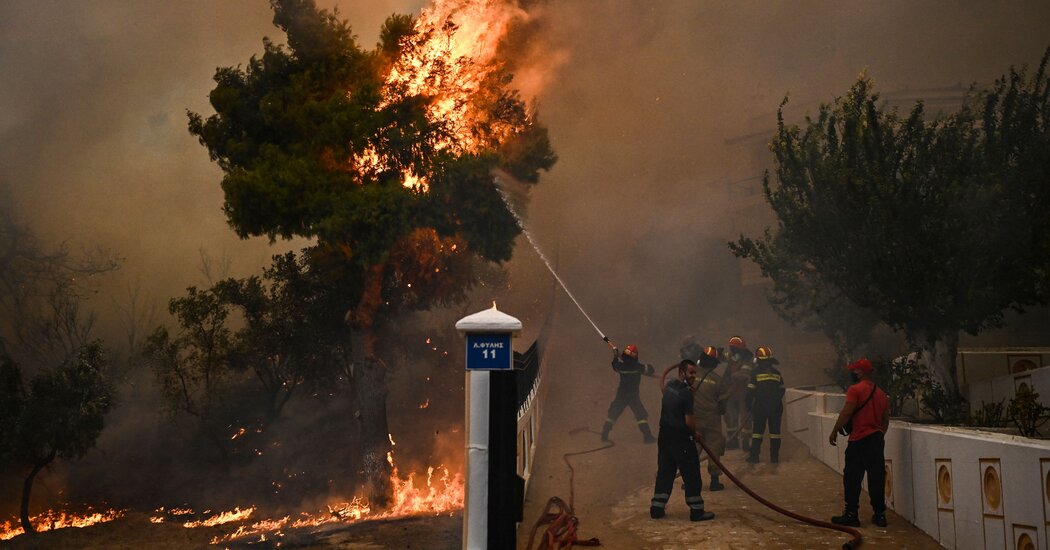Wildfires ravaged northern Greece for a fifth consecutive day on Wednesday and forced the evacuation of settlements on the outskirts of the capital, Athens. The authorities said they were battling scores of blazes around the country after weeks of searing heat turned many areas into tinderboxes.
“It is the worst summer for fires since records began,” said Vassilis Kikilias, the civil protection minister.
In villages in the northeastern Evros region, desperate residents on foot or riding scooters rushed to beat back fires only to watch bigger ones rise up around them. Exhausted firefighters used trucks and water-scooping helicopters to tackle the rapid advance of a blaze in one spot while flames grew out of control in another.
By Wednesday evening, it was clear that on both major fronts for the wildfires, in the north and near Athens, they remained largely uncontrolled.
Mr. Kikilias said that rescue forces were giving “110 percent” in their efforts to douse fires around the country, noting that 355 new ones had broken out in the past five days — 209 of them in the last 24 hours.
Forces were responding as quickly as possible, but gale-force winds were hampering their efforts, he said, describing an “unprecedented situation” after a series of heat waves.
The main fronts in the north and near Athens, where blazes reached Parnitha National Park, were considered the most dangerous.
Scientists say that Greece is one of a set of countries straddling the eastern Mediterranean and Middle East that will become hotter and drier faster than most of the rest of the world as climate change advances. This summer has been a preview of the future, which is coming fast.
The European Union has aided the efforts in Greece, deploying seven airplanes, one helicopter, 114 firefighters and 19 vehicles across the country. Because of climate change, the European Union now maintains a standing force for such emergencies, highlighting that the challenge has already become too big for countries to manage alone.
On Tuesday, the bodies of 18 people, among them two children, were discovered in a forest in the Evros region, near the border with Turkey. The authorities said they believed that the dead were migrants who had perished as the fire outran them but warned that identifying them would be challenging.
In the northern port city of Alexandroupolis, ash rained on empty waterfront tavernas and a thick pall of smoke made breathing hard. Farther inland, past smoldering swaths of forest, locals in villages and farmsteads battled flames with sticks and buckets of water as firefighters deployed helicopters and aircraft droned overhead.
Just north of Athens, the authorities ordered the evacuation of the settlement of Agia Paraskevi, near Parnitha National Park, including a monastery and 50 residents of retirement homes. The Amygdaleza migrant camp was also evacuated as a precaution, said Yiannis Artopios, a spokesman for the Greek fire service.
Homes burned in Agia Paraskevi as well as in Menidi, on the outskirts of Athens, according to the authorities and residents.
Despite upgrades to firefighting forces in recent years, “significant things” need to be done if Greece is to be able to respond to the “extreme situation” that is being stoked by climate change, Mr. Kikilias said, citing devastating wildfires in Hawaii and in Canada as other examples of the global challenge.
Greece regularly battles major wildfires that become deadly. Its hot, dry, windy summers combined with native pine forests and combustible undergrowth create the ideal environment for blazes to grow out of control.
But measures to prepare for fire season, like digging firebreaks and clearing out dry grasses, are insufficient. Environmental groups say that the government has mishandled the risk and underinvested in firefighting equipment and training.
The Greek Supreme Court prosecutor ordered an investigation on Wednesday into the causes of the fire in Evros, including the possibility that a criminal organization of arsonists was behind it.
The court was also investigating the detention of 13 migrants by three men who blamed them for the fires and shoved them into a windowless trailer, livestreaming their vigilantism on social media. A lawyer for one of the men, who appeared to be in charge and who livestreamed the events on Facebook, said that his client had conducted a lawful citizen’s arrest and had treated the migrants humanely.
The latest wildfires are the second time this summer that the country’s firefighting forces have been torn between multiple fronts. In July, thousands of tourists were evacuated from the islands of Rhodes and Corfu, popular resorts that largely depend on seasonal visitors.
For Athenians, Mount Parnitha provides a respite from heat waves in an ever-warmer city with few green spaces, and the national park plays a key role in cooling the city. Much of the mountain was ravaged in a series of blazes in 2007, when fires also killed scores of people in the southern Peloponnese region of Greece.
On Wednesday, Athenians faced a difficult day as the air quality deteriorated and the extensive flames on the mountain gathered strength.
In Kirki, a small village in Evros, residents who were evacuated on Monday returned to find destroyed properties. “I grew up in this home,” cried Ioannis Kaltsos, 83, standing next to the carcass of a blackened house with no roof.
“On the way here, I saw what’s left of our forest. It was the most beautiful place,” he added. “My heart broke.”
Nearby, in the village of Avra, a farmer with his wife, daughter and a worker tried to fight back growing flames to save their livestock. Firefighters arrived, and a helicopter emptied a huge load of water, but it seemed to make little difference.
“It’s too late,” he said. “The animals are dead.”


